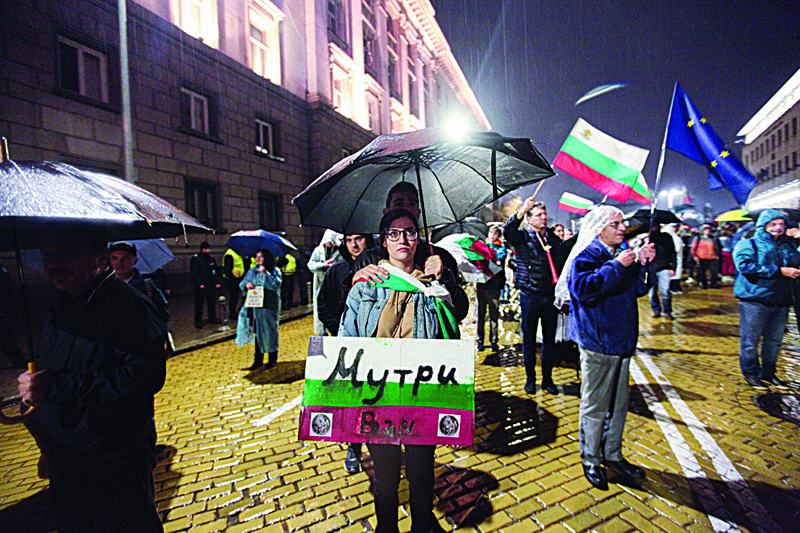

SOFIA: In a hundred days of sweeping and at times violent protests, thousands of Bulgarians have tightened the screws on the political elite - but this, they say, is only the beginning. "I am tired of the government's refusal to hear our demands, but I keep protesting as an act of defiance," Mila Loarova, a 39-year-old puppet theatre actress and director, snaps.
On the 100th day of protests in Sofia on Friday, several thousand people braved pouring rain to once again demand the resignation of Prime Minister Boyko Borisov and his conservative cabinet, as well as the country's chief prosecutor, Ivan Geshev. They accuse the government of favoritism, dependence on powerful oligarchs and weaponizing prosecutions against political opponents - the most serious accusations Borisov has faced during his almost ten years in power.
"Our problem lies in the mere perception of what is normal. We are so used to corruption, nepotism, broken pavements, road potholes, ugly buildings, wrecked cars that for us what an ordinary European would consider inadmissible has turned into something ordinary," says Kolarova's partner, Vladimir Vasilev.
'Up against a wall'
Two high-profile incidents lit the protesters' fuse. First, a live broadcast on Facebook in July revealed that an oligarch had sealed off a public beach for his seaside villa and that state security agents barred public access to it. Then, heavily armed police and prosecutors raided the offices of one of Borisov's most trenchant critics, President Rumen Radev.
Vasilev, a 42-year-old engineer and musician, says years of bad governance blurred people's perception until these incidents acted "as a big hand coming out of the fog to slap you in the face and you say to yourself: Damn, this cannot just go on like that". Despite considerable pressure to resign and a storm of other allegations of high-level corruption and influence peddling, Borisov has refused to step down, saying he will remain in power until the end of his term in March 2021.
Recent polls, however, show that Bulgarians no longer see Borisov as the no-nonsense tough guy and former firefighter with a black belt in karate who communicated to voters with ease. Some 66 percent of Bulgarians back the protests and 44 percent want his immediate resignation and snap elections, while Borisov's personal approval rating dropped to an all-time low of 20.3 percent, according to a recent Alpha research poll. "This is what the protest did - it totally shifted the position of this government - from someone at the top and in power, to someone who is absolutely put up against a wall, lacking any legitimacy," Vasilev says.
'The people awoke'
The demonstrations also consolidated ordinary Bulgarians, who realized that they were not alone in pushing for more morals, integrity and intelligence in politics, he adds. People from all walks of life -and from across the political spectrum - have joined in the evening rallies, a first for Bulgaria, and hundreds of Bulgarians living abroad have also staged protests. After weeks of calling for Brussels to turn its eye to developments in its poorest member state, the European Parliament last week passed a critical resolution.
It offered "unequivocal support for the people of Bulgaria in their legitimate demands and aspirations for justice, transparency, accountability and democracy". In a failed bid to appease protesters, Borisov sacked several key ministers. But a night of violence on Sept 3, when anti-riot forces dispersed the rally by force, arrested 126 protesters and beat dozens in an unprecedented show of force only exacerbated people's anger.
"To me, one very meaningful victory of the protest… is that the people awoke and got back this will to fight for what's right," Kolarova says. As of today, however, she sees "no rosy happy end". "Like Sisyphus, it is important to go back down there every time and start pushing that boulder up again because that's just the beginning of the road and we have to walk it," she said. "We must be ready to protest for hundreds and hundreds more days in the future," Vasilev adds. - AFP
